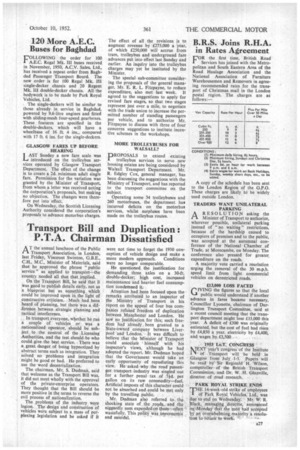Transport Bill and Duplication: P.T.A. Chairman Dissatisfied
Page 29

If you've noticed an error in this article please click here to report it so we can fix it.
AT the annual luncheon of the Public Transport Association, in London, last Friday, Viscount Swinton, G.B.E., C.H., MC., Minister of Materials, said that he approved the phrase "public service" as applied to transport—the country needed all that that implied.
On the Transport Bill, he said that it Was good to publish details early, not as a blneprint but as something which could be improved upon in the light of constructive criticism.. Much had been heard of planning, but there was a difference between strategic planning and tactical interference... .
In transport everyone, whether he ran a couple of * vehicles or was a nationalized operator, should be subject to the control of the Licensing Authorities, and the test should be who could give the best service. There was a, great danger of being hypnotized by abstract terms such as integration. They solved no problems and integration might be good or bad. He preferred to use the word decentralization.
The chairman, Mr. S. Dudman, said that welcome as the Transport Bill was, it did not meet wholly with the approval of the private-enterprise operators. They thought that the Bill should be more positive in the terms to reverse the evil process of nationalization.
The problems of the industry were legion. The design and construction of vehicles were subject to a mass of perplexing legislation and he asked if it were not time to forget the 1930 conception of vehicle design and make a more modern approach. Conditions were no longer comparable.
He questioned the justification for demanding . three axles on a 30-ft. double-decker; high cost, increased maintenance and heavier fuel consumption corn:termed it.
Attention had been focused upon the remarks attributed to an inspector of the Ministry Of Transport in his report on the appeal of four bus companies refused freedom of duplication between_ Manchester and London. He saw no justification for this; such freedom had already . been granted to a 'State-owned company between Liverpool and London. It was difficult to believe that the Minister of Transport could associate himself with his inspector's views, although he had adopted the report. Mr. Dudman hoped that the Government would take an early opportunity of repudiating this view. He asked why the road passeñ;. ger transport industry was singled out for a further penal tax of 71d. per gallon on its raw commodity—fuel. Artificial imposts of this character could not be absorbed and could be met only
by the travelling .public. • Mr. Dudman also referred to the shocking state of the roads,.. and tbe niggaidly sum expended on them—often wastefully. This policy was uneconomic and suicidal.












































































